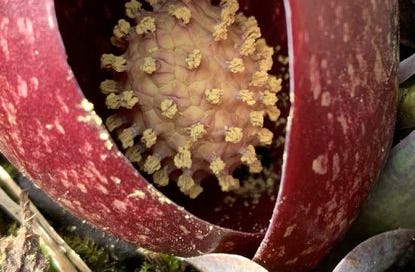In evolutionary biology, “morphospace” is the three-dimensional graph of all possible body shapes an organism or species might grow to inhabit over time. I love this word. I think about it a lot as I think about the ways my body has grown and changed in the last several years — hairier, heavier, more bear-like — and the many ways trans bodies push at the boundaries of what it means to find one's shape in flesh, idea, and modifications.
I found a similar point of view in a recent newsletter from Fran O'Farrell, in which she writes a delightfully thorough breakdown of each story in A Natural History of Transition. Ignoring the fact that I'm not sure what I did to deserve such an exquisite close reading, I find it's relevant to quote here a few sentences from O'Farrell's reading of the long story "Winter of Men", specifically the moment when Lydia’s gender changes as a skunk cabbage pushes through the duff in the nearby woods:
The moment that a plant pushes through the ground is and isn’t a start. It was there before, but it wasn’t there like this. You don’t need to have always felt trans to transition, something might instead glitch, corrupting open your data to new possibilities. Isn’t mutation the only way we keep life going through violently changing environmental conditions?
Emphasis added by me. What is there left to say after that? "We keep life going", not through reproduction, not through lineage, but through endless experimentation with our own selves and relationships. This is a kind of pro / creation.
:::
Since this is a newsletter, I suppose I should include some actual news once in awhile. Here is an interview I did that aired on the local public radio station in my hometown about A Natural History of Transition. In it I talk a about the two stories most explicitly based in the region: “Winter of Men” and the title story.
I also had a lovely long interview published by The Seventh Wave, in which I got to talk at length about writing this collection, trying to write the physical world, and my process in general.
Finally, if you’re new here, thank you for coming along to find out what this newsletter is about. Sometimes it’s publishing, sometimes it’s rock pools. The title is from a work in progress about neither of those things, which is progressing and has found a new title: The Water Years. It includes this piece, and more. I hope to share more with you as soon as I find someone to publish it.
What I’m Reading
You Don’t Have to Go to Mars for Love by Yona Harvey. I’ll admit that I bought this book based on the title alone (and the fact that it won the Believer Poetry Award). And I am glad that I did. The long title poem is rhythmic and strangely beautiful, and reading it aloud to my love one afternoon on the beach as we waited for a good friend to come back from his walk was a bewitching experience. It created a temporary entrance into another world. I’ve been putting off reading the last few poems in the book because I don’t want to stop exploring it.
Publishing Opportunities
West Trade Review is accepting submissions of fiction and poetry.
Tin House is hiring a Workshop Manager. $40k, deadline to apply is June 20.
The Seventh Wave Magazine is open for submissions of poetry and prose to Issue 14: Economies of Harm. Seventh Wave is also accepting applications for its editorial internship. Deadline June 30.
Black Ocean Books is accepting submissions of full-length poetry manuscripts by BIPOC writers. Deadline June 27.
smoke and mold is open for submissions of poetry, prose, and hybrid work for Issue 5: Hurricane Season. Deadline July 15.
My book A Natural History of Transition, is available now through Metonymy Press.
First time here? Subscribe below. You can find more of my writing at calangus.com.




